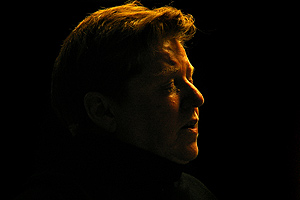 Presented by the Adelaide Cabaret Festival
Presented by the Adelaide Cabaret Festival
Reviewed Fri 11th June 2010
http://www.adelaidecabaretfestival.com
Venue: Dunstan Playhouse, Adelaide Festival Centre
Season: finished,one performance only
Duration: 1hr 40mins
Bookings for all Cabaret Festival shows: BASS 131 241 or http://www.bass.net.au
The Great War was supposed to be “the war to end all wars” but, only a couple of decades later, its name was changed to World War I when the world went to war for a second time. In 1918 British soldiers were told that they would be returning to a “land fit for heroes”, but the reality was far from this as many found themselves unemployed and cast aside. In Germany things were even worse. This is the era that Robyn Archer illuminates in this performance, by looking at the work of a number of German composers, specifically concentrating on the period from 1920 to 1933.
With a small group of musicians, led by Michael Morley at the piano and featuring piano accordionist, George Butrumlis, she delves into the lives and music of the likes of Kurt Weill and Bertolt Brecht, Kurt Tucholsky and Friedrich Hollaender, in a show that is part performance and part musicological treatise, an impression heightened by her use of a lectern. This would, without doubt, be the most intellectually stimulating offering in this Cabaret Festival and a thoroughly absorbing and enriching session it proved to be. One could not fail to be impressed by the research that had obviously gone into this work.
There were songs that were familiar, some that were not, quotations from writers of the time, like Hanns Eisler, and even recitations of lyrics for which the music has been lost, bound together by enlightening background information and anecdotes. Although the performance was primarily in English, Archer sang a few of the songs in the original German.
She explained the conditions existing in Germany during the Weimar Republic era, the poverty and starvation, and how they created the conditions for what came later. She tells of the emigration of so many of these prominent figures, leading to the end of this rich cultural period, the zenith of German Kabarett.
Archer had wisely prepared an encore, which she sang following tumultuous applause, but she had underestimated the audience reaction and found it necessary to then repeat one of the songs from the show, the ever popular Falling in Love Again, to satisfy our desire for more. It is a shame that there was only one performance of this terrific piece.
Reviewed by Barry Lenny, Arts Editor Glam Adelaide.



















